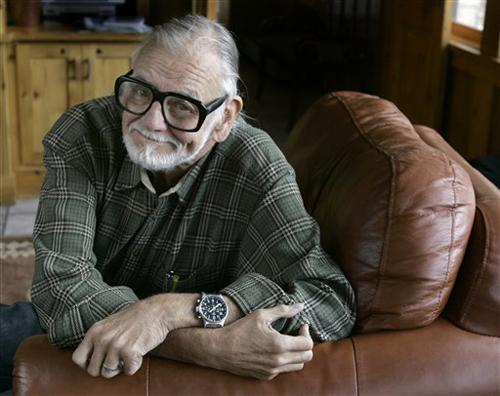George Romero goes back to basics in ‘Diary of the Dead’

Feb 7, 2008
Bitten by a zombie, his fate sealed, a character in George Romero’s new film mutters to a friend, “Shoot me.” The friend first points a video camera at the man, then a gun.
Romero’s latest zombie film uses the same handheld, subjective camera approach as “The Blair Witch Project” and “Cloverfield.” Calling into question the morals and motives of whoever is filming, it makes the case that YouTube and MySpace are as frightening as walking dead.
“If Hitler were alive today, he wouldn’t have to stand out in that square. He could just put out a blog and he’d have millions of followers,” Romero told The Associated Press in an interview. “It’s completely uncontrolled. It’s not information, it’s opinion. And it’s scary. You can get an audience no matter what your opinion is.”
In “George A. Romero’s Diary of the Dead,” opening in limited release Feb. 15, footage is purported to have been filmed by survivors of a wave of zombies, then pieced together with news clips and scenes from surveillance cameras. The cameraman at one point decides he can’t run to help his friends off-screen because he’s busy charging camcorder batteries.
Romero, who now lives in Toronto, said he made his fifth zombie film in 20 days with a $2 million budget. The result is a raw, ragged tale more reminiscent his landmark first movie, 1968’s “Night of the Living Dead,” than the explosion- and star-filled 2005 box office flop, “Land of the Dead.”
Get The Daily Illini in your inbox!
“I could see this going toward ‘Thunderdome,'” Romero said, referring to Mel Gibson’s third “Mad Max” movie. “I really fled. This was not the direction I wanted to go. … I was trying to escape and really get back to the basics, back to the roots. Do a really small, truly independent film that was in my control, entirely.”
“Diary” begins with a group of college students filming a zombie movie as a school project. Through his mostly unknown actors, Romero complains about the modern state of the sub-genre he helped create.
“Zombies don’t move fast!”
“Could somebody please explain to me why girls in scary movies have to fall down?”
“There’s always an audience for horror … with an underlying thread of social satire.”
The lines make for good insider laughs. But one worries that the zombie king might have gotten too self-aware for his own good.
“You just wish you could lobotomize yourself, and just do a thing that’s really on instinct,” he said. “There’s always a certain self-consciousness. And you worry about that.”
Previous “Dead” movies poked at the Vietnam War, racism, consumerism, militarism and class differences. (Remakes and homages, including Zack Snyder’s successful 2004 “Dawn of the Dead,” have largely steered clear of overt commentary.) Romero says he wouldn’t do the work if he couldn’t mix in politics.
“People say you’re trapped in this genre. You’re a horror guy. I say wait a minute, I’m able to say exactly what I think, I’m able to talk about, comment about, take snapshots of what’s going on at the time. I don’t feel trapped. I feel like this is my way of being able to express myself.”
Settled into an armchair in a hotel lobby in Park City, Utah – where his film played the midnight movies section of the Sundance Film Festival – the 67-year-old filmmaker seems supremely comfortable in his own wrinkled skin.
He’s seeking residency in Canada after being “shocked” by the last two presidential elections. Fondly recalling Walter Cronkite and such mainstream TV anchors, he’s also unapologetically puzzled by the current scattered, personalized media landscape.
“There’s no power on the tube any more. It’s the computer, the iPod and whatever these new gizmos are. And everybody’s in touch with it,” he said. “There is serious debate going on, but most of it, and the stuff that people are attracted to, is in some way entertainment. Is Michael Moore an honest documentarian? Honestly? I don’t think he is. … The real discussion gets left behind the entertainment value.”
It only follows that Romero would want viewers of his stories to look beyond the entertainment value of squib-filled vests and heads split by scythes.
“All of my zombie films have been about the humans. The zombies, they could be anything,” he said. “They could be an avalanche, they could be a hurricane. It’s a disaster out there. The stories are about how people fail to respond in the proper way. They fail to address it. They keep trying to stick where they are, instead of recognizing that maybe this is too big for us to try to maintain. That’s the part of it that I’ve always enjoyed.”
Up next, Romero is plotting a potential sequel to “Diary of the Dead.” Surprisingly, it would be his first direct follow-up. While the previous “Dead” movies are linked thematically, they feature different sets of characters and different versions of the apocalypse.
“The only way I can see to do it is to continue this story about this theme,” he said. “There’s a lot more I could say.”





